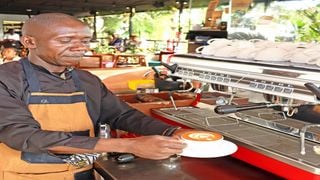
Kennedy Rashid an employee at Sirwo Coffee Shop in Nairobi makes coffee on February 17, 2024. PHOTO | BONFACE BOGITA | NMG
|Life & Style
Premium
How coffee drinking culture is changing
Some people are unbearable if they have not had their shot of espresso in the morning. “Don’t talk to me until I have had my coffee,” is a sentence you often hear from religious coffee drinkers.
Coffee has become a major part of many people’s lives, especially those who cannot start their day without that hit of caffeine.
Some opt to make it at home using instant coffee. Others have invested in their coffee-drinking habits by buying coffee makers while most would line up in the morning at coffee shops to get their dose.
As of 2024, an estimated 2.25 billion cups of coffee are consumed worldwide every day, according to data from Statista. That is nearly one cup for every three people on earth daily. Major brands such as Starbucks and Dunkin’ have boosted the coffee-drinking culture worldwide because of their innovative coffee drinks and clients who deem it almost mandatory to have a cup of coffee every day.
In Kenya, there has been an increasing number of stakeholders engaging in value-addition, which has led to an increased number of consumption outlets due to a steady supply of processed coffee. According to the Coffee Directorate’s latest report, the coffee outlets increased from 231 in 2019 to 506 in 2021.
Boutique coffee shops have been the backbone of the growing coffee-drinking culture. Even though Kenya produces millions of tonnes of coffee yearly, Kenyans have always preferred tea, but this is a promising change. Sirwo Coffee Cafe and Bistro is one of the boutique cafes that recently opened in 2023 and brings coffee from the farm to a mug. The director of brand and strategy, Catherine Kittony, explains that her family’s farm in Kitale used to be mainly for maize farming until 2012 when they started planting coffee due to the rich volcanic soils that presented a robust foundation. Now, the farm only grows coffee.
“Most family-run estates in Kenya typically sell their beans to the export market. We decided to share our coffee with Kenyans by opening Sirwo Coffee Cafe and Bistro in Nairobi. The space is intended to enhance our farm-to-consumer experience, from our estate Sirwo Farm, nestled in the Cherangany Hills in Kitale, where we grow our grade AAA coffee,” she said.
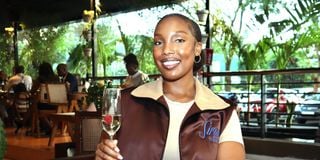
The signature collection at Sirwo Coffee features a Dark Roast from Arabica beans with a smooth, robust finish and a sweeter taste, with flavour notes of chocolate, sugar and hints of fruits or berries. The Medium Roast is from the Batian beans, named after the highest peak of Mount Kenya. The high-altitude variety has a unique flavour profile. It is sweet with good acidity, complex notes and full body.
“Kenyans are becoming more conscious about the kind of coffee they are consuming. Kenya has historically been a tea-drinking nation, some may say, thanks to colonialism. We are seeing more chic cafes pop up, micro-roasters roasting single-origin beans and great blends, and baristas with latte art skills that will blow your mind. The future is caffeinated and Kenya is ready to pour a cup,” said Ms Kittony.
The baristas play a major role in influencing people to drink coffee by innovating new and exciting drinks by mixing flavours and experimenting. They craft classic and unique drinks to suit every palette—for those who play it safe and those who dare to explore.
Many may think that coffee can only come as an espresso or a latte, but for those who would like an extra kick, there is a variety of alcoholic options by baristas. At Sirwo, the latte is the most ordered drink on the menu since it is the safest option for beginners and those who like something safe.
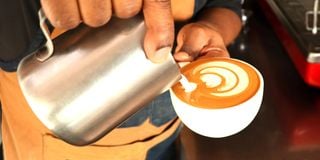
Tulip Coffee made at Sirwo Coffee Shop in Nairobi on February 17, 2024. PHOTO | BONFACE BOGITA | NMG
The difference between most classic coffee drinks is the varying amounts of steamed milk or water and espresso used in each beverage. For instance, an Americano is made of a shot of espresso and water, while a Cappuccino is made of one or two shots of espresso, steamed milk and foamed milk.
Curtis Majani, a barista at Sirwo, explains the more adventurous side of coffee drinking, starting from the Irish coffee, which is whiskey mixed with a single Americano and served hot.
“The espresso martini is one of the most ordered cocktails. It is made with a shot of vodka, a shot of medium roast espresso, cinnamon-infused coffee liquor and sugar. We also serve a boozy latte which is mixed with creamy liquor such as Baileys. For those who enjoy rum, we have a cocktail called the Rum Rhapsody made with dark rum, espresso and brown sugar,” he explains.
Ms Kittony found a way of involving artists in their coffee business by having a coffee-themed brunch—a sip and paint brunch. Njoki Kahungura, an artist, leads the guests through a session of painting on canvas using coffee-based paints, which is her speciality.
The brunch, which happens on the last Saturday of every month, consists of two cocktails or mimosas, a brunch menu, a cheese board and a painting, all for Sh4,000.
Apart from serving drinks, some coffee businesses sell their beverages for clients to enjoy at home.
The Coffee Directorate reports that the number of coffee stakeholders engaged in the roasting and packaging business rose from 25 in 2019 to 35 in 2021.
Coffee businesses such as Spring Valley Coffee and Sirwo Coffee have their roasteries and package their coffee for sale. Spring Valley Coffee is Africa’s first BCorp-certified coffee roastery.
Ritesh Doshi was a regular consumer of Spring Valley Coffee, which started in 2009. He later bought the business in 2018 when they were only selling two varieties of coffee: gourmet, (medium roast coffee) and espresso (dark roast coffee).
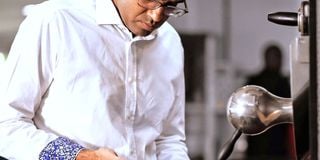
“Initially, he did not want to get into the coffee shop business but instead wanted to show what Kenya offers to the world. He then had a realisation that changed the trajectory of his plans.
“There was no one producing premium coffee in Kenya for Kenyans. Most of the good stuff was being exported. We wanted to showcase coffee from different parts of the country, different flavour profiles and different types of producers.
“The first coffee we introduced was Zamanee from Kericho in the Nandi hills, which is traditionally a tea-producing area,” he says.
Exquisite coffee
Then follows the Elgon coffee from Kenya’s side of the mountain but is processed naturally, meaning little water is used and the beans are left to dry on sunbeds, unlike Zamanee which is fully washed.
“We also have the Peaberry coffee, which was seen as a defective bean years ago. It is a smaller-sized bean. It is round as opposed to the oval shape that most beans have. It packs a lot of flavour. It is difficult to get it right but if you do it right, you get exquisite coffee,” Mr Ritesh explained.
Just like wine tasting, coffee varieties have tasting notes. Mashariki, one of the coffee varieties offered by Spring Valley Coffee, comes from Embu.
“When roasted, it unlocks hints of burnt sugar and a full body with the sweetness of vanilla malt, while tingling the taste buds with orange peel acidity and leaving the subtle flavours of baker’s chocolate lingering on the palate. For those who are not fans of caffeine, there is a decaf option as well.
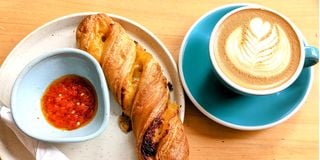
Other than serving hot drinks, they also have cold options such as iced coffee and coffee-infused milkshakes. A lovely ode to coffee is the chocolate-covered coffee beans, a creation of Spring Valley Coffee, that come in either dark, milk or white which are such a treat or a great gift.
“For us, transparency in the supply chain is very important. We want people to know what they are consuming and where it came from. Quality starts at the producer because we can control the roasting and extraction process.
To make sure we get the right flavour profiles we need, we trace the coffee from the farmer to the auctions and buy it,” he says.
The coffee is then taken to the roastery and is released after 4 days. Ritesh says that coffee is great between seven to 14 days which is why they package it in 250-gramme bags for faster consumption as the coffee does not taste as great as it should after that period. The packaging shows where the coffee came from, the altitude of the area and who roasted the coffee.
“People ask me what is the best way to have coffee, as a trick question. I think drinking any coffee is a good starting point. Instant coffee is usually the first contact of coffee for most people. Have coffee the way you enjoy it,” he said.
Ritesh says that some prefer to make their coffee at home which led him to begin selling La Marzocco espresso machines for $4,000 (Sh570,000) and capsule machines for Sh37,000. When a customer buys a bag of coffee beans, they are ground in the style that suits them - coarse, medium and fine, depending on what coffee machine you have at home.
“Even a sufuria with a sieve is a coffee machine. We have some interesting customers who buy our most exquisite coffee and that is how they prepare it and there is absolutely nothing wrong with that. Statistics show that 7 per cent of all beverages being consumed in Kenya is coffee, of which 5 per cent is instant coffee. So only two percent is what we call brewed coffee in a machine. This could be about half a million people consuming brewed coffee,” he said.
Spring Valley Coffee has six snug spots across Nairobi but the Wilson airport branch is the only one that prepares and sells food which is a requirement for any restaurant that is set up in the airport. Unlike most coffee shops, Spring Valley Coffee’s only business is selling coffee. In their shops, you can spot some snacks or tea on the shelves near the counter but those are sourced from other businesses they are in partnership with.
“What job does coffee do for people? For some people, it is convenient but they want quality coffee because we are not the cheapest. For some, it is a daily ritual for people like me. I have a specific morning routine and part of it involves me getting a cup of coffee while I am walking my dog. I have seen people come into our coffee shops to sign deals, work, chat, read or with their families. There is a large number of Somali Kenyans who drink coffee as most of them do not consume alcohol. We have fanatical customers and we have been led by them through our expansion from the time we only had one location,” he says.
When he was younger, Ritesh recalls drinking Dormans coffee which was among the first coffee brands that Kenyans were introduced to. Then came the first Java House at Adam’s Arcade in 1999 which started as a coffee shop before becoming an American diner-style restaurant.
“Our coffee journey as a country has evolved as the population evolved. Java made Kenyan coffee accessible then Artcaffe came along and made it aspirational. To survive, these businesses had to venture into other businesses such as making breakfast, lunch with burgers or fish and chips,” he says.
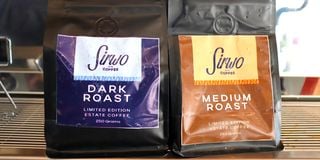
From having only six coffee shops in the whole country in the 1980s, you cannot miss a coffee shop in any major street or shopping mall. Whether you are a coffee drinker or not, the word coffee alone means a lot, especially when you ask someone, “Would you like to meet up for coffee?”





